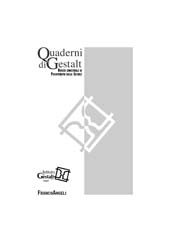La ricaduta nell'addiction come espressione del "crollo dello sfondo"
11-31 p.
In questo articolo gli autori propongono una riflessione teorica e clinica sulla ricaduta nell'addiction secondo il modello della psicoterapia della Gestalt. Si sostiene l'ipotesi che la recidiva sia l'esito di un complesso processo che investe la dimensione neurobiologica, emotiva, relazionale e situazionale della persona. Attraverso un linguaggio che cerca di superare la tendenza allo stigma dei pazienti addicted, gli autori sostengono che la ricaduta sia l'espressione di una difficoltà a trovare sostegno nella propria fisiologia, nel sistema di contatti scontati, nella ridefinizione di sè che attraversano ogni percorso di cura delle addiction. In situazioni di questo genere può verificarsi quello che gli autori chiamano "un crollo dello sfondo", cioè il venire meno di quelle certezze che garantiscono la stabilità e la sicurezza per il paziente addicted
La prevenzione delle ricadute mira a co-creare col paziente un campo relazionale che promuova il sostegno alla capacità di fare contatto attraverso il sistema di contatti scontati e il corpo risensibilizzato, e attraverso una nuova definizione di sè sul piano identitario, relazionale e sociale. Parte fondamentale di questo lavoro di prevenzione è l'individuazione e la gestione di possibili stimoli attivanti (triggers). L'articolo è arricchito da numerosi riferimenti a ricerche neuroscientifiche sul tema e da un accenno ad un caso clinico. [Testo dell'editore]
Although addiction is a topic that has been studied widely in Gestalt therapy, the specific issue of relapse into addiction is not explored enough, both in theoretical and clinical works. Referring to neurobiological aspects, the authors support the hypothesis that relapse into addiction expresses a "collapse" of the ground experience; they describe this phenomenon as based on a disturbance of the id and personality functions of the self in a difficult field. A peculiarity of addiction is the risk of relapse even years later due to a neuro-functional modification sustained by craving. Relapse could be the outcome of a complex process involving the neurobiological, emotional, relational and situational dimensions. It is the expression of a difficulty in finding support in one's own physiology, in the system of contacts that are taken for granted, and in the redefinition of the self that runs through every addiction treatment pathway
In these situations, a "collapse of the ground" can occur it is about the loss of those certainties that guarantee stability and security for the addicted patient. In the therapeutic field with these patients, we contact a failure history in the wish to belong, and failure of relational recognition, with neuropathological and psychological consequences. Implicit in the therapeutic work with addiction is the work on the ground experience, the support system that comes from the spontaneous physiology and the complex of self-definitions in the different situational systems. A short clinical case shows how in relapse the functions of the self may collapse regressing to primal modes of adaptation and reducing the integrative capacity of the self. Relapse prevention aims at co-creating a relational field that promotes support for the ability to make contact through the discounted contact system and the resensitised body, and through a new self definition on the identity, relational and social level
Relapse prevention focuses on the creative reconstruction of a safe ground that has been desensitised by addiction experiences. A fundamental part of this prevention work is the identification and management of possible activating stimuli (triggers). The authors draw on an extensive scientific literature on the subject of relapse in addiction and a view that does not blame the patient. [Publisher's text]
-
Articoli dello stesso fascicolo (disponibili singolarmente)
-
Informazioni
Codice DOI: 10.3280/qg2024-2oa18194
ISSN: 2035-6994
MATERIE
PAROLE CHIAVE
- Ricaduta Addiction funzioni del sé riconoscimento relazionale esperienza dello sfondo psicoterapia della Gestalt
- relapse addiction functions of the self ground experience Gestalt therapy relational recognition


